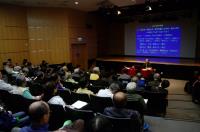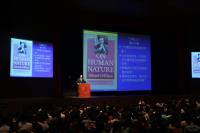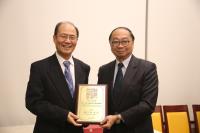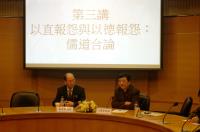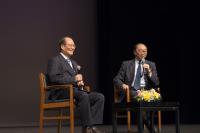
|
|








|






|
| Prof. Liu Xiaogan chaired the 31st Ch'ien Mu Lecture in History and Culture | |
|
The "Ch'ien Mu Lecture in History and Culture" aims to promote academic and cultural exchanges. Ever since its first appearance, the Lecture has been hosted each year by scholars with significant contributions and outstanding achievements in the various fields of Chinese cultural studies within and without the country. The lecture series has been receiving permanent endowment of the Mr. Chan Chi-sun Chinese Culture Fund since 2013.
The first lecture "Human Nature: From Mencius to Scientific Discovery" was held on 16 March at Sir Run Run Shaw Hall, CUHK, and was moderated by Prof. Henry Wong Nai-ching, Head of the College. It was widely known that, in Chinese Culture, Mencius championed fundamental goodness of human nature while Xunzi held the opposite. In fact, when it came to human nature, there existed a wide spectrum of questions that required consideration and exploration. This talk attempted to address and discuss these issues. The second lecture "Is there such a thing called Human Nature? Normative and Empirical Approaches" was held on 17 March at the Lecture Theatre of the Hong Kong Museum of History, with Prof. Lau Kwok-ying of the Department of Philosophy of the CUHK as the moderator. Among the many important studies on Mencius' theory of human nature, the views of Mou Zongsan and those of Roger Ames represented two opposite understandings, which could serve as a starting point for our discussion. Finally, Prof. Liu, making reference to discoveries of modern scientific experiments, discussed how today's societies should understand and interpret Mencius' theory and what perspectives they should adopt as regards human nature. The third lecture "Repaying resentment by Virtue or Straightforwardness? Confucianism and Daoism" was held on 19 March at Cho Yiu Conference Hall of CUHK, and was moderated by Prof. Wang Qingjie of the Department of Philosophy of the CUHK. Laozi once advocated an idea that one should return good for evil, while Confucius believed in repaying injustice with justice and returning good for good. At first glance, these two claims seemed contradictory and might even prove the conflicts between Daoists and Confucianists. Instead of directly judging who was right or wrong, this lecture attempted to explain why and under what contest both theories, apparently in opposition, were right and necessary, and elaborated on their values in modern societies. The three lectures received an enthusiastic response from teaching staff and students within and without the university, and inspired fruitful discussion between the speaker and the audience during the Q&A session. |
|
Copyright 2025. New Asia College, The Chinese University of Hong Kong. All Rights Reserved.
This E-Newsletter is solely owned by New Asia College. The College accepts no liability for any loss or damage howsoever arising from
any use or misuse or reliance on any information in this E-Newsletter.






